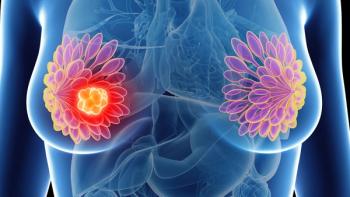
Oncologists Attribute Pandemic-Related Burnout to Loss of In-Person Patient Interactions
Data presented at the 2021 ASCO Quality Care Symposium demonstrated that in-person interactions had a bigger impact of professional satisfaction than financial stability.
The driving force behind oncologist and hematologist burnout during the COVID-19 pandemic was the loss of in-person patient interaction, revealed data from a study presented at the 2021 ASCO Quality Care Symposium.1 Although income-related concerns also contributed to a decrease in professional satisfaction, this factor was ranked second in importance.
Results showed that among 259 community oncologists and hematologists surveyed, 46% attributed the loss of in-person patient interaction as factor contributing to their feelings of burnout compared with 42% citing practice financial loss. Moreover, 50% of those surveyed reported that they experienced more burnout at work since the COVID-19 pandemic began (36% agreed, 14% strongly agreed).
“Given the high baseline rate of burnout among these physicians, it remains critical to prevent, mitigate, and control additional risks [created by] pandemic-related factors,” lead study author Ajeet Gajra, MD, FACP, a clinical professor of medicine at Upstate Medical University, said in a presentation of the data.
About one-third (31%) of respondents neither agreed nor disagreed that they experienced more burnout at work since the COVID-19. Sixteen percent disagreed with the question, and 3% strongly disagreed.
The COVID-19 pandemic has had a significant impact on healthcare workers globally. Investigators have observed higher than normal rates of burnout have been reported, especially among frontline workers. Organizations such as ASCO have attempted to assess the impact of the pandemic on oncologists in the United States, but further research is needed to understand the full impact community oncologists and hematologists, as these groups experiences several unique challenges.
In this study, investigators sought to assess the impact of the pandemic among community oncologists and hematologists in the United States prior to widespread distribution of COVID-19 vaccines.
Investigators conducted a web-based survey from October 2020 to December 2020 that included questions regarding the impact of the pandemic on both the personal and professional lives of community oncologists and hematologists. Demographic and practice setting information were collected for participants, and all participants were compensated for completing the survey. Investigators then then analyzed the responses using descriptive statistics.
Respondents had a median of 18 (range, 1-42) years in practice. Most worked in academic settings. Practice setting for study participants were as follows:
- Academic center or affiliated teaching hospital: 17%
- Community practice, owned by large entity: 16%
- Large, privately owned, community practice (with more than 10 physicians): 14%
- Small, privately owned, community practice (2-5 physicians): 14%
- Solo practitioner: 11%
- Medical center or cancer center: 10%
- Community-based hospital: 9%
- Medium-sized, privately owned, community practice (6-10 physicians): 9%
Thirty-six percent of participants were geographically located in the South, 22% in the West, 22% in the Midwest, and 20% in the Northeast. Furthermore, 51% of participants reported that their perception of the trend in COVID-19 cases in their local area was stable, 29% said it was increasing, and 20% reported that it was decreasing.
Additional data showed that 49% of participants reported that the pandemic had a moderate impact on their professional life, 33% reported a slight impact, 11% reported a severe impact, and 7% reported no impact at all. In term of their personal lives, 48% reported a moderate impact, 28% reported a slight impact, 17% reported a severe impact, and 7% reported no impact at all.
Factors that contributed to negative impacts on professional lives included, concerns over patients transmitting COVID-19 to themselves or their staff (52%), difficulty providing care to patients (45%), loss of income (41%), loss of patient volume (37%), inability to attend scientific meetings in person (35%), added expense to make the practice safe (32%), fear of litigation due to telemedicine visits and potential missed findings (8%), and other (2%).
Factors that contributed to negative impacts on personal lives included, concerns about safety of themselves and their families (84%), a sense of anxiety (50%), loss of family income (24%), a sense of depression or doom (22%), space limitations due to more family members working from home (11%), friction with family due to working from home (10%), and other (5%).
Additional factors that contributed to feelings of burnout among participants included reduced patient volume (35%), access to necessary supplies and/or medicine (29%), personal financial loss (27%), layoffs of other staff members (23%), increased patient volume (12%), and other (5%).
Finally, factors that impacted income among participants included the change from office-based to telemedicine visits (38%), pay cuts from their hospital or practice (33%), cancellation of elective services/procedures (31%), reassignment to other departments in need (6%), and other (6%). Moreover, 22% of participants reported that their income had not been impacted by the COVID-19 pandemic.
Reference
- Gajra A, Jeune-Smith Y, Fortier S, et al. Impact of COVID-19 pandemic on oncologists’ professional and personal lives: A pre-vaccine study. J Clin Oncol. 2021;39(28): 45-45. doi:10.1200/JCO.2020.39.28_suppl.45
This article was originally published on OncLive as “Loss of In-Person Patient Interaction is Key Factor in Pandemic-Related Burnout Among Oncologists”
Newsletter
Knowledge is power. Don’t miss the most recent breakthroughs in cancer care.































































































